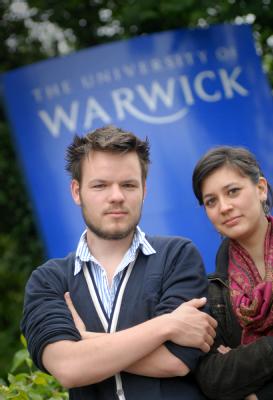Students board WWF’s climate change voyage
 On Monday 9th June, two students from Warwick University will be setting off to the Arctic on a ‘Voyage for the Future' as part of WWF’s climate change programme.
On Monday 9th June, two students from Warwick University will be setting off to the Arctic on a ‘Voyage for the Future' as part of WWF’s climate change programme.
Emma Biermann (a second year Politics and International Studies student) and Casper ter Kuile (a third year History and Sociology student) have been chosen to become UK Ambassadors for global climate change along with 16 students from eight other countries.
Travelling to Svalbard, Norway, the Ambassadors are likely to witness history – the North Pole could be ice-free for the first time this summer. The 10 day voyage will include on-board lectures from WWF staff and expert scientists in the field.
The students will leave the program with a wealth of new knowledge of climate change, its effects and potential solutions. Having seen the harsh realities of the impacts of climate change in the Arctic, they will work with WWF to deliver the message for urgent action on this issue.
Emma said: “Climate change is the biggest issue facing us today, especially our generation. The Arctic is experiencing some of the most extreme effects, including melting ice-caps causing rising sea-levels. I am looking forward to uniting with other young people concerned about the effects of climate change and working together for emissions reductions globally.”
Casper said: “I'm volunteering with WWF because my generation needs a voice to force leaders to act on climate change. We need at least 80% reduction in CO2 emissions by 2050. Politicians, business leaders and the public are all beginning to take action on Climate Change - and I am determined to ensure that we continue”.
Through the students’ lobbying, changes have already been made at Warwick University to improve its environmental record. An Environmental Manager was employed by the University two years ago because of successive years of petitions and this year the kitchens in all the halls of residence will have a large recycling bin which is expected to change recycling rates from 20% to possibly 90%.
University of Warwick Vice Chancellor Professor Nigel Thrift said: "We're very proud of Casper and Emma and their work with the WWF. Staff and students are working hard on the challenges presented by climate change - researching sustainable technologies and green energy sources as well as the economic and social issues."
Follow their journey online at wwf.org.uk/voyageforthefuture. Here you can see photographs taken in the field and read weblogs describing their experiences.
Climate change is already damaging the world's ecosystems and climate change in the Arctic is expected to be among the greatest of any region on Earth. The Arctic is not only one of the places on earth most vulnerable to climate change, but also a place where vulnerability is of urgent global relevance. The release of greenhouse gases from its carbon sinks could further fuel global warming. Left unchecked, climate change will be devastating for species, habitats and people.
WWF is calling on the Government to commit to reduce the UK’s CO2 emissions by at least 80 per cent by 2050 in the Climate Change Bill and for this to include emissions from aviation and shipping.
- ends -
Editor's notes
If everyone used natural resources and generated carbon emissions at the rate we do in the UK we would need three planets to support us. The way we live is leading to environmental threats such as climate change, species extinction, deforestation, water shortages and the collapse of fisheries. WWF’s One Planet Future Campaign is working to help people live a good quality of life within the earth’s capacity. For more information visit wwf.org.uk/oneplanet
For further information and photographs, please contact:
Sophie McCallum, tel: 01483 412387, email: smccallum@wwf.org.uk
